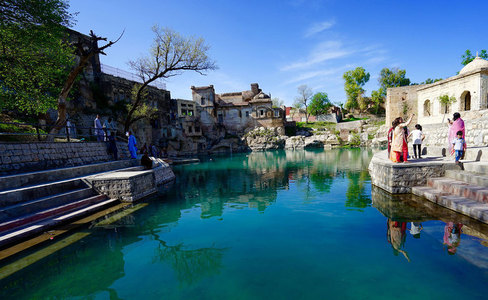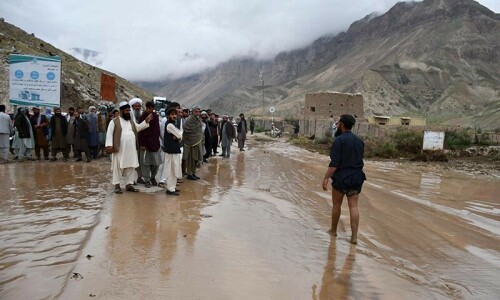Chief Justice of Pakistan (CJP) Justice Saqib Nisar during Tuesday's proceeding of Katas Raj case barred lower courts from hearing any petitions regarding the ongoing case.
"Subordinate courts are not authorised to hear any case that is being heard in the Supreme Court," he declared. "I'm instructing all civil judges [not to admit any case regarding the temple]. We are only issuing a verbal order right now."
Last month, the SC had taken suo moto notice of the Katas Raj case — which is being heard by a three-member bench headed by the CJP — on the basis of media reports that the temple complex pond was drying up because cement factories nearby were drawing a large amount of water through a number of sub-soil wells, severely reducing the water table in the general area.
Also read: 1500 years of our history — Enter the Katas Raj temples
During Tuesday's hearing, Justice Nisar took the cement factories in the area to task, terming them "destructive", and demanded to know the names of the factories that are located near the temple. Punjab government's counsel told the court that Best Way Cement Factory Chakwal, Ghareeb Wall Factory and DG Khan Cement were among the factories near the temple.
The bench also expressed displeasure at the absence of idols from the temples, demanding to know why there were no statues in the temples of Shiri Ram and Hanuman.
"Do the authorities even have the idols or have they been displaced?" the CJP asked.
The lawyer representing Evacuee Trust Property Board (ETPB) blamed former chairman Asif Hashmi for the current state of affairs.
"Asif Hashmi earned millions of rupees from corruption [during his tenure] and then ran away [from the country]," the ETPB lawyer claimed.
Justice Nisar responded by asking why Hashmi had not been arrested, saying that the court can summon Home secretary of Punjab and foreign secretary for answers.
The hearing of the case was adjourned until tomorrow (Wednesday).
'Aquifer feeding pond severely stressed'
In a previous hearing of the Katas Raj case, the Punjab government had admitted that an aquifer feeding the pond at the Katas Raj temple complex was under stress and this has caused a drastic fall in the water level.
A report placed before the court in compliance with the suo motu notice on the drying up of the fabled pond attributed the depletion of water to a number of factors.
The report explained that the Katas Raj temple lies in the mineral-rich Salt Range, which has four cement plants. One of these is just two kilometres from the historic site. Since there is no major source of water in the vicinity, the factories rely on sub-soil water to meet their needs.
Katas Raj temple
The Katas Raj temple is one of the Hindu community's most well-known places of worship. The name of the temple complex is a derivative of Kataksha, a Sanskrit word meaning “tearful eyes”.
According to legend, the pond was formed after Lord Shiva wept uncontrollably upon the death of Sati, his wife.
The pond occupies an area of two kanals and 15 marlas, with a maximum depth of 20 feet.













































